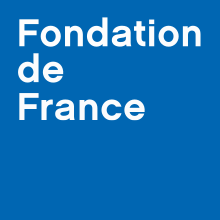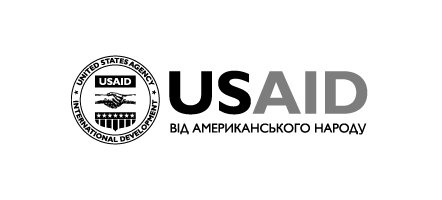
Yevheniia Kotkalo, director of the Center for Out-of-School Education in Mykolaivka, Sumy region, has been working with children for many years: she taught at school and was a classroom teacher, so she knows the problems and needs of young people. In the fall of 2022, at a youth forum in the Sumy region, she had the opportunity to join the screening and discussion of the film “Lisa, Come Home” by Oksana Burai, which is part of the Docudays UA International Human Rights Documentary Film Festival collection. The experience of the screening and the discussion prompted Yevheniia to apply for the DOCU DIY 2.0 competition and to open a documentary film club at the Center for Out-of-School Education in her community.
Reprinted from the Sheriffs for New Communities Information Platform.
The Mykolayivka community in Sumy region is located very close to the border with Russia. Residents of the community often experience air raids and shelling. Despite the realities of the wartime, the community's youth need to communicate with their peers, meet, learn, and organize interesting and useful leisure activities. Recognizing these needs, in April 2023, Yevheniia initiated an advocacy campaign to get the local authorities to allocate a separate room for the Mriya+MY youth space in the community. Mykolaivka’s dreamers wanted at least one room for the needs of young people, but as a result of the advocacy campaign, they received a separate 2-storey building with a shelter. The result far exceeded the expectations of the campaign initiators. Now the youth of the community will be able to actively participate in clubs, workshops, trainings and, of course, in the work of the documentary film club.
At our request, Yevheniia Kotkalo told us about the opportunities that the film club has provided the community with and about the (un)expected result of her advocacy campaign.

Yevheniia Kotkalo
We just wanted to get one room to hold events for young people. The Center for Out-of-School Education did not have its own premises. We had to ask educational institutions to help us organize classes on leadership, psychological support for students, and clubs for young people. Of course, this was difficult because it created additional workload for the school. I found out there was an empty room in one of the cultural centers that we could use, but the local department of culture did not meet us halfway and refused to provide the premises.
We turned to local deputies, spoke at the executive committee of the local council, explaining what we would do and why it was important to involve young people in informal education, but we were denied a free-of-charge room for the Center.
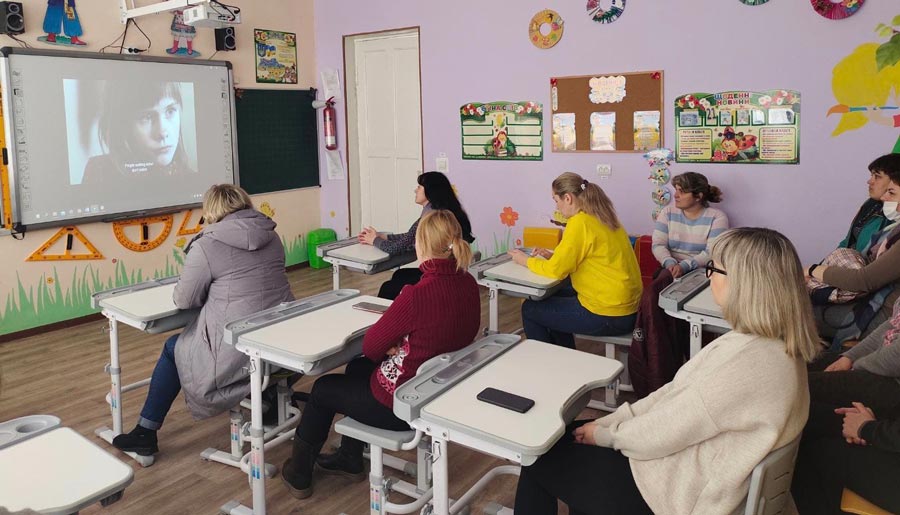
Screening a film for community educators during an advocacy project
Thus, during the advocacy campaign, we came up with the idea of creating a youth space at the Center for Out-of-School Education. This would allow us to participate in various grant projects aimed at young people. The village council suggested creating a children's advisory council that would bring together active youth and give them the opportunity to initiate the implementation of their own ideas.
It was the film club that helped us achieve our goal. First of all, it was important that our small community had a representative office of a powerful all-Ukrainian network. This has already worked in our favor. Secondly, the community realized that documentary films can be an effective tool for working with young people.
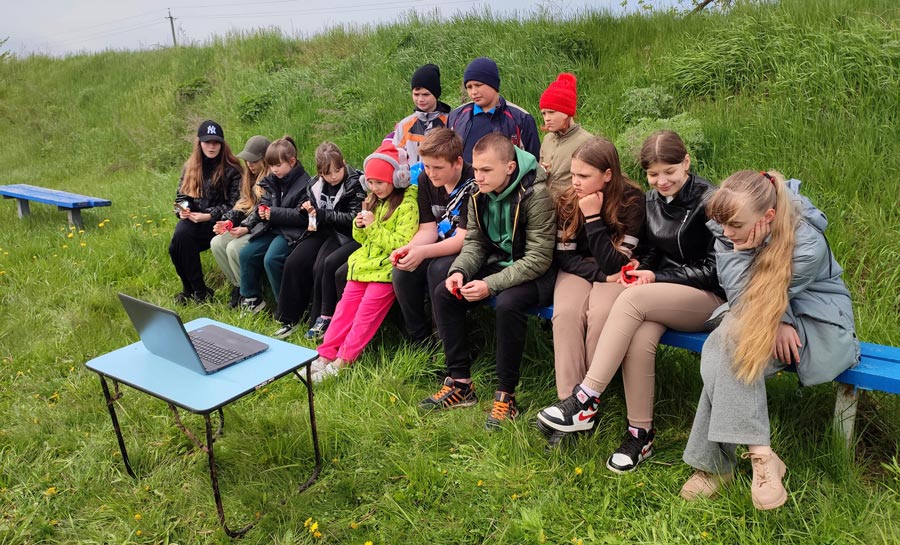
As part of the advocacy campaign, film screenings were held even outdoors
Of course, during the advocacy campaign, we focused on films about youth and for youth. For example, almost every educational institution screened “The Champion” by Hungarian director Mate Bart and “Lisa, Come Home” by Lithuanian director Oksana Burai. Students, parents, and teachers were invited to watch these films. To show how dangerous uncontrolled Internet use can be, we watched the French film “Pranked” by Ismaël Joffroy Chanduti. I wanted to explain how important it is to have a space where children and young people can engage in hobby groups and communicate with adults who support and develop them. The movie “Giovanni and the Water Ballet,” directed by the Dutch filmmaker Astrid Bussink, helped explain how important the leaders of the clubs are for children. We wanted to ensure that the youth space would be well organized, so that we would be able to offer interesting ideas to the community, introduce them to experts, and hold workshops and trainings on topics that have never been discussed here before. We are already planning to hold trainings on gender equality and media literacy, and this is important for our youth and the development of their competencies.
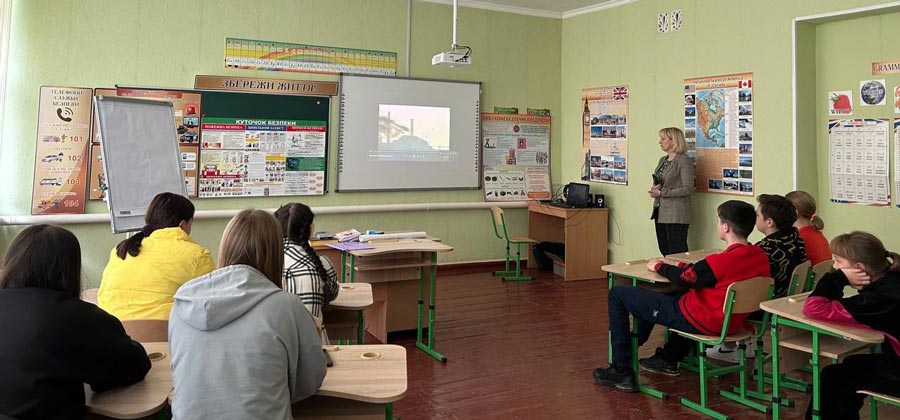
Screening and discussion of the film “Lisa, Come Home” with highschoolers
These events with movie screenings and discussions helped us achieve our goal. We managed to explain why the community needs a youth center and a children's advisory council. I prepared an appeal to the village council with a request to allocate premises for a youth center and a proposal to create a children's advisory council at the village council. This time, at the session, the deputies voted in favor of both proposals. We were allocated not even a room for the youth space, but a separate 2-storey building with a shelter. It is easy to use and accessible. Now the renovation work is being completed, and we are developing a plan for our activities and coming up with ideas for the first events, because we have much greater opportunities and prospects now. We have also announced the recruitment of candidates for the children's advisory board and started working in this direction.
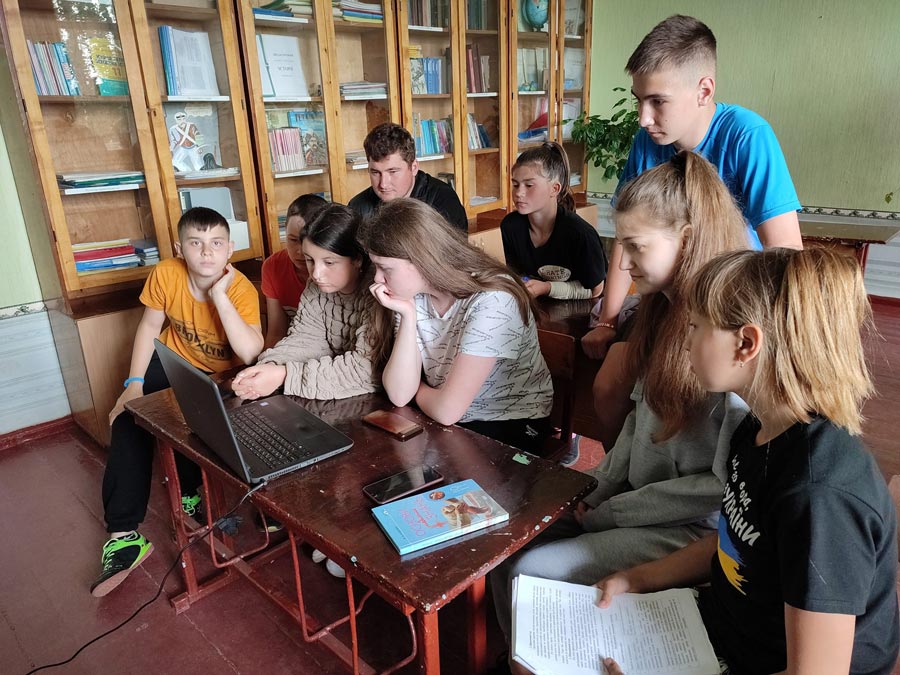
Schoolchildren watch a documentary
The security situation in our community is difficult. Due to the proximity to the border, we do not announce our events publicly and do not gather large audiences. I often ask people to pass on information about the screenings by word of mouth, so that those who are interested in joining us can come. But the space usually fills up. Children are interested in watching the film and discussing it with their peers. At the end, I also suggest trying something new. For example, after the screening of the film “And Every River,” Olesia Morgunets-Isaenko organized an upcycling workshop where children learned how to reuse plastic so that it does not end up in rivers. They were very interested. I can already see how they are looking forward to the fall and the beginning of the new season at the film club, to be able to meet, communicate with their peers and learn something new.
The development of the DOCU/CLUB Network is funded by the United States Agency for International Development (USAID), the Embassy of Sweden in Ukraine, the National Endowment for Democracy (NED) and Fondation de France.
The opinions, conclusions, or recommendations are those of the authors and compilers of this publication and do not necessarily reflect the views of the governments or charitable organizations of the respective countries. The authors and compilers are solely responsible for the content of this publication.
P.S. The project “Community Law Centers in Ukraine” is implemented by the Charitable Organization “Charity and Health Foundation” and the NGO “Legal Space Information Resource Center” with the support of the Charles Stewart Mott International Foundation. The opinions expressed in this material are those of the authors and do not necessarily reflect the views of the Charles Stewart Mott International Foundation.
All news
